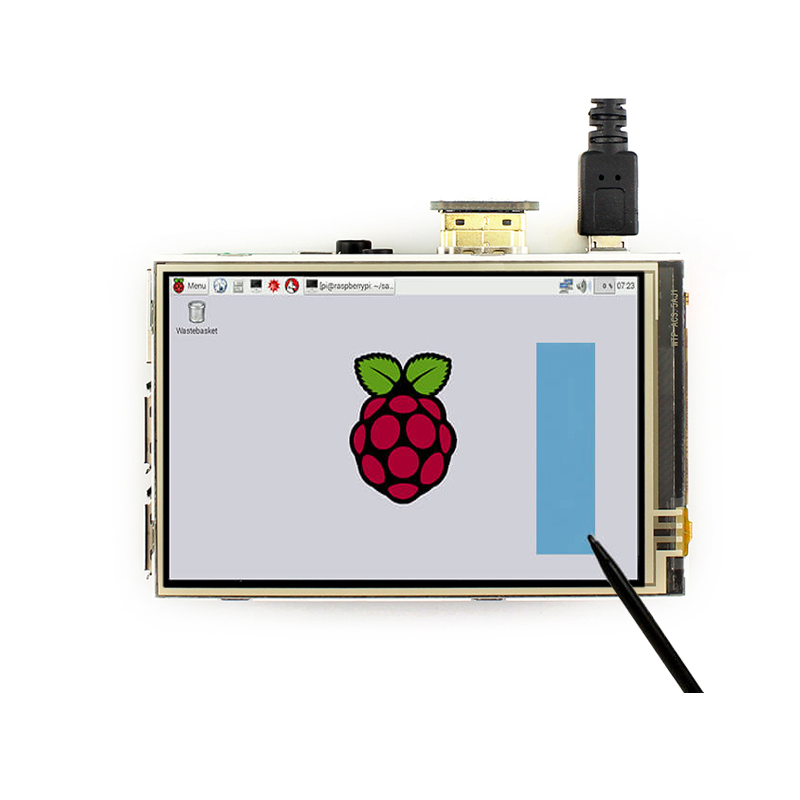- sales/support
Google Chat:---
- sales
+86-0755-88291180
- sales01
sales@spotpear.com
- sales02
dragon_manager@163.com
- support
tech-support@spotpear.com
- CEO-Complaints
zhoujie@spotpear.com
- sales/support
WhatsApp:13246739196
Raspberry Pi 3.5inch HDMI LCD User Guide
Getting Started
Hardware Connection
- Plug the LCD to your Raspberry Pi:
- There are 40 pins on Raspberry Pi Model A+/B+/2 B/3 B but only 26 pins on the LCD, so you should pay attention to connecting the pins to your Pi accordingly.
- Connect the HDMI Connector to both the HDMI interfaces on the LCD and the Pi.
- You should connect the LCD to Raspberry Pi Model B or Raspberry Pi Zero with an HDMI cable rather than an HDMI Connector.
- Turn on the "backlight" switch on the back of the LCD.
You can enable the touch in two ways: Method 1. install driver to your Raspbian/Ubuntu Mate OS. Method 2. use the Ready-to-use image file of which LCD driver was pre-installed.
Method 1. Driver installation
1) Download the Raspbian / Ubuntu Mate image from Raspberry Pi website and extract it on a PC.
2) Connect your micro SD card to the PC and write the image to the card using Win32DiskImager. How to write an image to a micro SD card for your Pi? See RPi Image Installation Guides for more details)
3) Copy the LCD driver to the micro SD card (or copy the driver to the system of Pi using a USB drive).
4) Append the following lines to the config.txt file which is located in the root of the card:
max_usb_current=1 hdmi_group=2 hdmi_mode=87 hdmi_cvt 800 480 60 6 0 0 0
5) The LCD will display after booting up. Then open a terminal to install the touch driver which can be found in the /boot/ directory. Note: Please make sure your Pi is connecting to the internet.
git clone https://github.com/waveshare/LCD-show.git cd LCD-show/ # There are two LCD resolution modes, choose one of the two to execute. ./LCD35-HDMI-480x320-show ./LCD35-HDMI-800x480-show
Touch function will work after restart. For ease of use, you can set the screen orientation, see: #Screen orientation settings.
- If the Raspbain you use is Lite version. You should use commands below to install driver
git clone https://github.com/waveshare/LCD-show.git cd LCD-show/ # There are two LCD resolution modes, choose one of the two to execute. ./LCD35-HDMI-480x320-show lite ./LCD35-HDMI-800x480-show lite
Method 2. Using Ready-to-use image
The image file with pre-installed driver is located in the IMAGE directory of the CD, or you can download it from #Image. Extract the .7z file and you will get an .img file. Write the image to your micro SD card (How to write an image to a micro SD card for your Pi? See RPi Image Installation Guides for more details). Then insert the card to your Pi, power up and enjoy it.
Audio out from HDMI
There is a 3.5mm jack on the LCD, which is used to play HDMI audio. Steps to use this jack:
sudo nano /boot/config.txt # edit the configuration file
Modify this line:
hdmi_drive=1
to
hdmi_drive=2
Exit with save: Hit ctrl + x -> Y
reboot # system reboot
apt-get install mplayer # install mplayer
mplayer music.mp3 # play music
Custom resolution
Hardware resolution of this LCD is 480x320 but you can change the resolution by software. In Raspbian, these resolution settings can work properly
480×320 800×480 800×600 1024×768 1152×864 1280×720 1280×768 1280×800
1280×960 1280×1024 1360×768 1366×768 1440×900 1600×900 1600×1024 1680×1050
The resolution can be configured by editing the /boot/config.txt file. Modify the line where hdmi_cvt is located, e.g. to change the resolution from 480x320 to 800x480, modify:
hdmi_cvt 480 320 60 6 0 0 0
to
hdmi_cvt 800 480 60 6 0 0 0
Screen orientation settings
After touch driver installed, the screen orientation can be set by these commands:
- 0 degree rotation
cd LCD-show/ # Choose one of the two to execute ./LCD35-HDMI-480x320-show 0 ./LCD35-HDMI-800x480-show 0
- 90 degree rotation
cd LCD-show/ # Choose one of the two to execute ./LCD35-HDMI-480x320-show 90 ./LCD35-HDMI-800x480-show 90
- 180 degree rotation
cd LCD-show/ # Choose one of the two to execute ./LCD35-HDMI-480x320-show 180 ./LCD35-HDMI-800x480-show 180
- 270 degree rotation
cd LCD-show/ # Choose one of the two to execute ./LCD35-HDMI-480x320-show 270 ./LCD35-HDMI-800x480-show 270
- if you use Raspbian-lite version
- 0 degree rotation
cd LCD-show/ # Choose one of the two to execute ./LCD35-HDMI-480x320-show lite 0 ./LCD35-HDMI-800x480-show lite 0
- 90 degree rotation
cd LCD-show/ # Choose one of the two to execute ./LCD35-HDMI-480x320-show lite 90 ./LCD35-HDMI-800x480-show lite 90
- 180 degree rotation
cd LCD-show/ # Choose one of the two to execute ./LCD35-HDMI-480x320-show lite 180 ./LCD35-HDMI-800x480-show lite 180
- 270 degree rotation
cd LCD-show/ # Choose one of the two to execute ./LCD35-HDMI-480x320-show lite 270 ./LCD35-HDMI-800x480-show lite 270
Touch screen calibration
- This LCD can be calibrated using a program called xinput_calibrator which can be downloaded from Xinput-calibrator_0.7.5-1_armhf
- Extract and copy the software Xinput-calibrator_0.7.5-1_armhf.deb to the Raspbian of your Pi.
- Install it with the commands:
sudo dpkg -i -B xinput-calibrator_0.7.5-1_armhf.deb
- Click the "Menu" button on the task bar, choose "Preference" -> "Calibrate Touchscreen".
- Finish the touch calibration following the prompts. Maybe rebooting is required to make calibration active.
- You can create a 99-calibration.conf file to save the touch parameters (not necessary if file exists).
/ect/X11/xorg.conf.d/99-calibration.conf
- Save the touch parameters (may differ depending on LCD) to 99-calibration.conf, as shown in the picture:

Interface
| PIN NO. | SYMBOL | DESCRIPTION |
|---|---|---|
| 1, 17 | 3.3V | Power positive (3.3V power input) |
| 2, 4 | 5V | Power positive (5V power input) |
| 3, 5, 7, 8, 10, 11, 12, 13, 15, 16, 18, 24 | NC | NC |
| 6, 9, 14, 20, 25 | GND | Ground |
| 19 | TP_SI | SPI data input of Touch Panel |
| 21 | TP_SO | SPI data output of Touch Panel |
| 22 | TP_IRQ | Touch Panel interrupt, low level while the Touch Panel detects touching |
| 23 | TP_SCK | SPI clock of Touch Panel |
| 26 | TP_CS | Touch Panel chip selection, low active |




